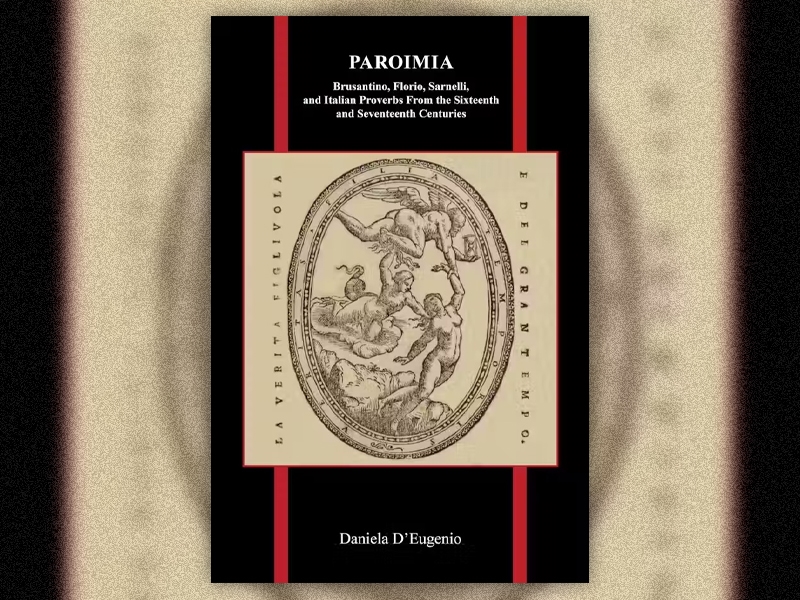Daniela D'Eugenio, assistant professor of Italian in the Department of World Languages, Literatures and Cultures, was awarded the 2022 First Book Award Prize. D'Eugenio's book, titled Paroimia: Brusantino, Florio, Sarnelli, and Italian Proverbs from the Sixteenth and Seventeenth Centuries, was published with Purdue UP in 2021. Boasting 572 pages and six illustractions, the book is an important contribution to the field of Italian studies.
The Book Award Committee of the American Association of Teachers of Italian said:
"The book makes an original, in fact a seminal, contribution to the understanding of the understudied form of the proverb, and shows how paroemia were used and how they managed to affect diverse genres of writing, as well as linguistic codes and the production of meaning itself. Paroimia takes the reader from the particular to the universal: the proverbs are seen as an archive of historical and cultural significance whose interpretations change through time. To this end, the use that Brusantino's Le cento novelle, Florio's Firste and Second Fruites and Sarnelli's Polilecheata make of the proverbs in their works reveal what these authors thought about society and culture in the 16th and 17th century, the changes of interpretations through time of the same proverbs in different literary works and, also the porosity between language and sociocultural factors. Among the book's many illuminating and entertaining contributions to Italian studies are Brusantino's use of paratextual elements (allegories, proverbs) to moralize (from a Counter-Reformation perspective) several of Boccaccio's most scandalous novelle, Florio's use of proverbs to teach the Italian language through real-life dialogues and Sarnelli's use of Neapolitan proverbs in fables to impart moral lessons. The book also includes a user-friendly index identifying proverbs and their place in the works under consideration. The end notes and the list of consulted works attest to the author's extensive research and critical engagement."
Congratulations to Daniela D'Eugenio on this stellar achievement.
To purchase Paroimia, click here.
Description of the Book
Proverbs constitute a rich archive of historical, cultural and linguistic significance that affect genres and linguistics codes. They circulate through writers, texts and communities in a process that ultimately results in modifications in their structure and meanings. Hence, context plays a crucial role in defining proverbs as well as in determining their interpretation. Vincenzo Brusantino's Le cento novella (1554), John Florio's Firste Fruites (1578) and Second Frutes (1591) and Pompeo Sarnelli's Posilecheata (1684) offer clear representations of how traditional wisdom and communal knowledge reflect the authors' personal perspectives on society, culture and literature.
The analysis of the three authors' proverbs through comparisons with classical, medieval and early modern collections of maxims and sententiae provides insights on the fluidity of such expressions and illustrates the tight relationship between proverbs and sociocultural factors. Brusantino's proverbs introduce ethical interpretations to the 100 novellas of Boccaccio's The Decameron, which he rewrites in octaves of hendecasyllables. His text appeals to Counter-Reformation society and its demand for a comprehensible and immediately applicable morality.
In Florio's two bilingual manuals, proverbs fulfill a need for language education in Elizabethan England through authentic and communicative instruction. Florio manipulates the proverbs' vocabulary and syntax to fit the context of his dialogues, best demonstrating the value of learning Italian in a foreign country. Sarnelli's proverbs exemplify the inherent creative and expressive potentialities of the Neapolitan dialect vis-à-vis languages with a more robust literary tradition. As moral maxims, ironic assessments or witty insertions, these proverbs characterize the Neapolitan community in which the fables take place.
Praise
"Dr. D'Eugenio has authored an exceptional scholarly monograph on Italian proverbial language based on a close analysis of three selected texts from the 16th and 17th centuries. Her use of interdisciplinary research to illustrate how Italian proverbs function as flexible literary instruments provides new insights into their meaning and function (individual, societal and cultural perspectives; ethical commentary; regional dialects). Moreover, the author's interpretive and analytical ability enhances our understanding of the malleable nature of this significant literary, linguistic and cultural form." — Frank Nuessel, University of Louisville
Topics
Contacts
Ryan Calabretta Sajder, associate professor
World Languages, Literatures and Cultures
479-575-3324,
